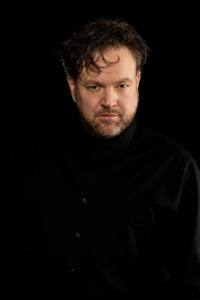 Christian Kluxen, conductor
Christian Kluxen, conductor
Now in his seventh season as Music Director of the Victoria Symphony, sixth season as Chief Conductor of the Arctic Opera and Philharmonic, and first season as the Principal Guest Conductor of the Turku Philharmonic, Christian Kluxen is regarded as one of the most exciting conductors to emerge from Scandinavia. Born in Copenhagen in 1981 to Danish-German parents, Kluxen has a natural affinity towards the Germanic and Scandinavian repertoire, particularly the works of Beethoven, Brahms, Richard Strauss, Nielsen, and Sibelius.
In the press he has been described as “a dynamic, charismatic figure” who “forms the music with an impressive vertical power of emotion and a focus on the grand form”, conducting “with exemplary clarity and a heavenly warmth.” From Canada, to Finland, and Norway, Maestro Kluxen has been recognized for his sincere and transparent leadership, innovative programming, and his bold, imaginative, and energetic interpretations.
Alongside his many and varied commitments with APO, Turku Philharmonic, and Victoria Symphony, recent and forthcoming guest engagements include Orchestre de Chambre de Lausanne, Odense Symphony, and Norrköping Symphony. On the operatic stage, Kluxen has conducted extensive tours of Don Giovanni and Madama Butterfly with the Danish National Opera, followed by his Berlin conducting debut with Die Zauberflöte at Komische Oper. In 2017, he led highly successful performances of Die Fledermaus with Aarhus Symphony Orchestra, and Ariadne auf Naxos with Arctic Opera and Philharmonic. In 2019, he led two full productions of Bizet’s Carmen; in Denmark at Opera Hedeland and in Norway with Arctic Opera and Philharmonic.
Kluxen’s concerts have been broadcast live in Denmark, the UK, Sweden, Norway and Canada. He has received several prestigious awards and prizes, and in 2016 he was nominated by the International Opera Awards as “Young Conductor of the Year.”
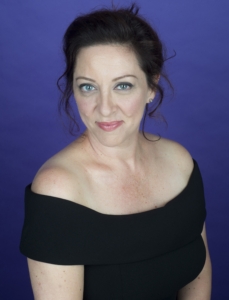 Nathalie Paulin, soprano
Nathalie Paulin, soprano
Soprano Nathalie Paulin has established herself in the United States, Canada, Europe, and Asia as an interpretive artist of the very first rank. Winner of a Dora Mavor Moore Award for Outstanding Opera Performance, she has collaborated with internationally renowned conductors including Harry Christophers, Jane Glover, Michael Christie, Robert Spano, Kent Nagano, Yannick Nézet-Séguin, Antony Walker, Bernard Labadie, Sir Roger Norrington, Andrew Parrott, David Agler, Jacques Lacombe, Graeme Jenkins, and Andrew Litton on both the concert platform and in opera. As well, critics have been lavish in their praise. Reviewing from Chicago, John van Rhein noted that “Paulin in particular is a real find; her rich, agile voice possesses great depth and allure, her manner radiates sensuous charm,” and for The New York Times, Steve Smith noted that “Paulin [sings] with rich tone and compelling emotion,” while Renaud Machart from Paris’ Le Monde writes: “Nathalie Pauiln was impeccable in diction, musicality and style.” Ms. Paulin debuted for L’Opéra de Montréal as Mélisande in Pélléas et Mélisande and for Chicago Opera Theater as Galatea in Acis and Galatea. She was re-engaged by Chicago Opera Theater for the title role in Semele and for Mary in La Resurrezione, both by Handel. She has also been heard as Susanna in Le nozze di Figaro for Cincinnati Opera and the Dallas Opera featured her in Carmen and Cunning Little Vixen.
The 2020/2021 season saw Nathalie join Chants Libres for L’Orangeraie, a new opera featuring music by Zad Moultaka and libretto by Larry Tremblay. The world premiere took place in October, with additional performances in both Montréal and Québec City, which garnered much critical acclaim. Nathalie returned to Montréal in March 2022 for a program of Bach cantatas with Les Violons du Roy at Salle Bourgie. Paulin rounded out the season with the Kitchener Waterloo Symphony, performing as the soloist in Mahler’s Symphony No. 2. Nathalie looks forward to joining the Victoria Symphony this winter for Handel’s Messiah.
The New Brunswick native’s recent seasons included Dear Life and Vivier’s Lonely Child for the National Arts Centre Orchestra in Ottawa and the extensive European Tour which followed; the title role in Beethoven’s Leonore (1805) for Opera Lafayette (D.C); Vivier’s Lonely Child and Mozart’s Requiem for the Vancouver Symphony; Handel’s Messiah for the Vancouver Chamber Choir; and she curated a programme for Montréal’s Arion at Bourgie Hall. Further engagements have included Blow’s Venus and Adonis for Clavecin en Concert, Lonely Child for Symphony Nova Scotia, Gorecki’s Symphony No. 3 for the Winnipeg Symphony, and Cherubini’s Stabat Mater for Ottawa’s Thirteen Strings. Of special interest were performances of scenes from late eighteenth century French operas by Sacchini, Cherubini and Martini, conducted by Ryan Brown for Opera Lafayette in D.C. and New York. Other credits in the USA and Canada include Messiah for Portland Baroque, the Naples Philharmonic, the New Jersey Symphony and Orchestre symhonique de Trois-Rivières; Fauré’s Requiem for the Vancouver Symphony; Carmina Burana for Festival de Lanaudière; Mahler’s Symphony No. 2 for the Kingston and Ottawa symphonies; Bach Cantatas for Stratford Summer Music; the title role in Theodora for Vancouver Early Music; the Countess in Le Nozze de Figaro for Opera Lyra Ottawa; and Beethoven’s Mass In C with Tafelmusik.
Ms. Paulin is highly regarded for the breadth of her musical curiosity and she has been engaged for works ranging from Jacques Hetu’s Les Clartés de la nuit with the National Arts Centre Orchestra and Handel’s Orlando with Washington Concert Opera to Micaela in Carmen with Opera Tampa to Beethoven’s Symphony No. 9 for the Seattle Symphony. She has been featured by Bard Summerscape in New York, the Handel and Hayden Society, Cincinnati Opera, Atlanta Symphony, Boston Baroque, Music of the Baroque, Brooklyn Philharmonic, Arizona Opera, Phoenix Symphony, Rotterdam Philharmonic, Mercury Baroque and the Colorado Symphony, as well as all the major orchestras and opera companies of Canada. On the festival circuit, she has been heard with the Wexford Festival in Ireland, the Fredericton Chamber Music Festival, the Elora Festival, Ottawa Chamber Music Festival, and the Scotia Festival in Halifax.
Frequently heard on both the French and English CBC networks, she is a past winner of the Montréal Symphony Competition and holds a Master’s Degree from the Université de Montréal. She won the Dvořák prize and has also received awards and prizes from the George London Foundation in New York, the Young Mozart Singers’ Competition in Toronto, and the Canadian Music Competition. Nathalie Paulin has been teaching voice as well as French Mélodie for undergraduate students, and Advanced French Lyric Diction for graduate students, at the Faculty of Music at the University of Toronto since 2008. Nathalie has also been on faculty at VISI (Vancouver International Song Institute), Orford Music (Quebec), the Barachois Musical Summer Academy (New Brunswick) and at the Stratford Summer Music Vocal Academy.
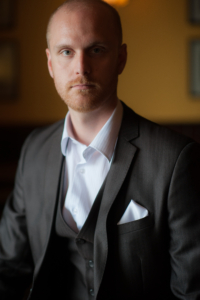
Geoffrey Sirett, baritone
Hailed by the Globe and Mail as “a brilliant performer,” “with the kind of magnetism that comes from combining realism with exhaustive extremes,” baritone Geoffrey Sirett won the 2018 Dora Award for Outstanding Opera Performance singing the leading role of Akaky in The Overcoat (Canadian Stage co-production with Tapestry Opera and Vancouver Opera). Sirett has emerged as one of Canada’s finest young baritones, in demand across the country for his wide range of operatic and concert repertoire.
Geoffrey’s recent and upcoming engagements include Carmina Burana with Orchestre Philharmonique et Choeur des Mélomanes at Maison Symphonique de Montréal, Elijah with Edmonton’s Richard Eaton Singers, and Handel’s Brockes Passion with Metropolitan United (Toronto). 2019-2020 highlights included Brahms’ Requiem for the Richard Eaton Singers and Messiah for the Ottawa Choral Society. In 2018-19, Sirett made his Canadian Opera Company debut as Welko in Arabella, sang Captain Corcoran in Edmonton Opera’s H.M.S. Pinafore as well as his aforementioned award-winning performances in The Overcoat. Summer 2018 saw him appear with Music & Beyond in Dido and Aeneas and as Escamillo in Carmen with Kelowna Opera. On the concert stage in 2017-18, he joined the Toronto Symphony for Weill’s Seven Deadly Sins and sang Messiah with the Peterborough Singers and St. John Passion with the Ottawa Choral Society and the Elora Singers.
Other highlights for Sirett include of the hit production The Bells of Baddeck in Nova Scotia as well as Orest in Elektra and Ping in Turandot for Edmonton Opera, Elijah for the Pax Christi Chorale, Messiah for the Newfoundland Symphony and Beethoven’s Missa Solemnis for the Grand Philharmonic Choir. Beethoven’s Symphony No. 9 (Orchestre symphonique de Drummondville), Bach’s B-Minor Mass (Sweetwater Festival), Mussorgsky’s Songs and Dances of Death (Off Centre Music Salon), The Merry Widow (Edmonton Opera), Damnation of Faust (Calgary Philharmonic), Prince Igor (VOICEBOX: Opera in Concert), Bach’s Mass in B Minor (Ottawa Bach Choir), and a Candlelight Christmas Concert (13 Strings Chamber Orchestra) have featured prominently in his recent seasons.
Further credits include John Adam’s The Wound Dresser (Victoria Symphony), Brahms’ Requiem (Ottawa Bach Choir), Purcell’s Dido and Aeneas (Theatre of Early Music), Handel’s Messiah (Winnipeg Symphony) as well as performances with the Talisker Players, Canadian Art Song Project, Orchestra London, Winnipeg Symphony, Victoria Symphony, and Nota Bene Baroque Orchestra. Appearances on the opera stage included Opéra de Montréal’s production of Kevin Puts’ Silent Night, Wolf-Ferrari’s Il segreto di Susanna with Opera5, and the world-premiere of MacDonald/Burry’s The Bells of Baddeck.
The premiere of James Rolfe’s Open Road, Brian Current’s Airline Icarus, Pergolesi’s La serva padrona, Dean Burry’s The Brothers Grimm, Bach’s Johannes Passion, Mozart’s Krönungsmesse, Stankar in Verdi’s Stifellio, Bach’s Weihnachtsoratorium, and Messiah are works he has performed for Soundstreams, Against the Grain, Canadian Opera Company, Ottawa Choral Society and Choeur St. Laurent. Sirett’s has sung roles in Don Giovanni, Le nozze di Figaro, Così fan tutte, Hansel and Gretel, Orlando, Candide, Il mondo della luna, Pagliacci, Der Kaiser von Atlantis, Gianni Schicchi, Albert Herring, A Midsummer Night’s Dream, West Side Story, and The Great Gatsby.
Geoffrey is a graduate of the University of Toronto where he completed a Master’s in Music (Opera). He is the winner of awards and prizes from a number of competitions including the Canadian Conservatory Vocal Competition, Ottawa Choral Society Competition, Czech and Slovak International Voice Competition, Metropolitan Opera National Council Auditions, and he received 2nd place and the “Best Performance of a Canadian Work” Award in the Orchestre symphonique de Montréal Competition. He is a five-time grant recipient of the Jacqueline Desmarais Foundation, and winner of the Vancouver Opera Guild Career Development Grant.
Winner of the Norcop Song Prize, his recital appearances include performances for the Aldeburgh Connection and Bayfield Festival of Song with pianist Stephen Ralls, Van Cliburn Foundation with composer/pianist Ricky Ian Gordon, and the Chautauqua Institution with pianists Craig Rutenberg and Mikael Eliasen. Collaborating with pianist Stephen Ralls, his first solo album Vagabond is a disc devoted to the works of Vaughan Williams, Butterworth, and Britten as well as premiere recordings of Canadian composers Ivan Barbotin and Jocelyn Morlock. Additional recordings include Airline Icarus, an opera by Brian Current, The Heart’s Refuge (Analekta: Theatre of Early Music) and The Vale of Tears (Analekta: Theatre of Early Music).
Geoffrey is the Artistic Director of Kingston’s Cantabile Choirs. Co-producer and music director for the indie opera company Bicycle Opera Project, Geoffrey continues his advocacy for contemporary Canadian music, spending his summers performing all-Canadian operas across Ontario, travelling exclusively by bicycle.
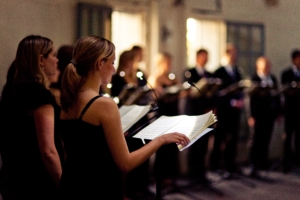 Vox Humana
Vox Humana
Vox Humana (Latin for human voice) is the name given to the organ stop that tries to emulate certain qualities of the singing voice. It is appropriate, then, that the name was first given to our choir by an organist and choral conductor, Sarah MacDonald. Now a Fellow of Selwyn College, Cambridge, and Director of Music of the choir there, Sarah gave Vox Humana its name and its start as a project choir in Victoria in the 1990s, in the hope that someone would continue the choir once she left her native Canada. That continuation started in 2002, when Garth MacPhee, then Director of Music of the Church of Saint John the Divine, produced the first season of concerts under the name Vox Humana. From 2004-2010, the group was led by soprano and conductor Wendy McMillan, from 2010 to 2020 by Brian Wismath, and since 2022 by current Artistic Director David Stratkauskas.
Vox Humana has gone from a relatively small group of no more than sixteen voices singing a cappella repertoire to a group of approximately twenty-four singers that frequently collaborates with soloists, small groups of instruments, other choirs, and full orchestras. Since 2004 they have been frequent guests of the Victoria Symphony. Their first two appearances were on the symphony’s very popular Christmas Pops programme, where they showed their versatility in performing everything from Praetorius to Britten to popular Christmas standards. Their collaborations with the symphony continued to include works such as Bach’s Christmas Oratorio, Handel’s Messiah, and Benjamin Britten’s powerful War Requiem, where Vox appeared alongside the Victoria Choral Society. The Victoria Symphony has also included Vox as a partner ensemble in two of their New Music Festivals; Vox presented its own programmes as part of the festival in 2014, featuring the music of Hungarian composer Gyorgy Ligeti, and in 2015, featuring the music of Irish composer Gerald Barry.
New music has taken a more central place in Vox’s repertoire; the group now commissions works annually from both recognized and emerging Canadian composers. Their most recent commission in 2015 was from Vancouver-based composer Rodney Sharman, a setting of a text by Oscar Wilde called Requiescat. Each of Vox’s programmes now include either a world premiere or a Canadian/BC/Victoria premiere. These premieres not only include brand new music, but also music that has been firmly established in the repertoires of other choral communities but not yet heard in Canada.
Vox released its first CD in September 2011, entitled Summer Rain. The title track is a composition by Estonian composer Toivo Tulev. The remainder of the CD features the music of Canadian composer Jeff Enns, and French composer César Geoffray.
Currently, Vox produces six to eight programmes per season. Two of these have become popular annual traditions. The first concert of the season, Vox in the Stars, takes place in one of Victoria’s most beautiful settings, the Dominion Astrophysical Observatory, high atop Observatory Hill in Saanich, BC. The choir sings inside the large steel-structured dome that houses the famous Plaskett Telescope. As the sun sets, the choir sings under the open roof of the dome with the heavens in full view. The other event that has become an annual tradition is A Child’s Christmas in Wales, a concert of seasonal music centered on a dramatic reading of Dylan Thomas’s beloved childhood recollection. In addition to traditional Christmas favourites, Vox has commissioned brand new carols and arrangements from local composers for inclusion on this programme.
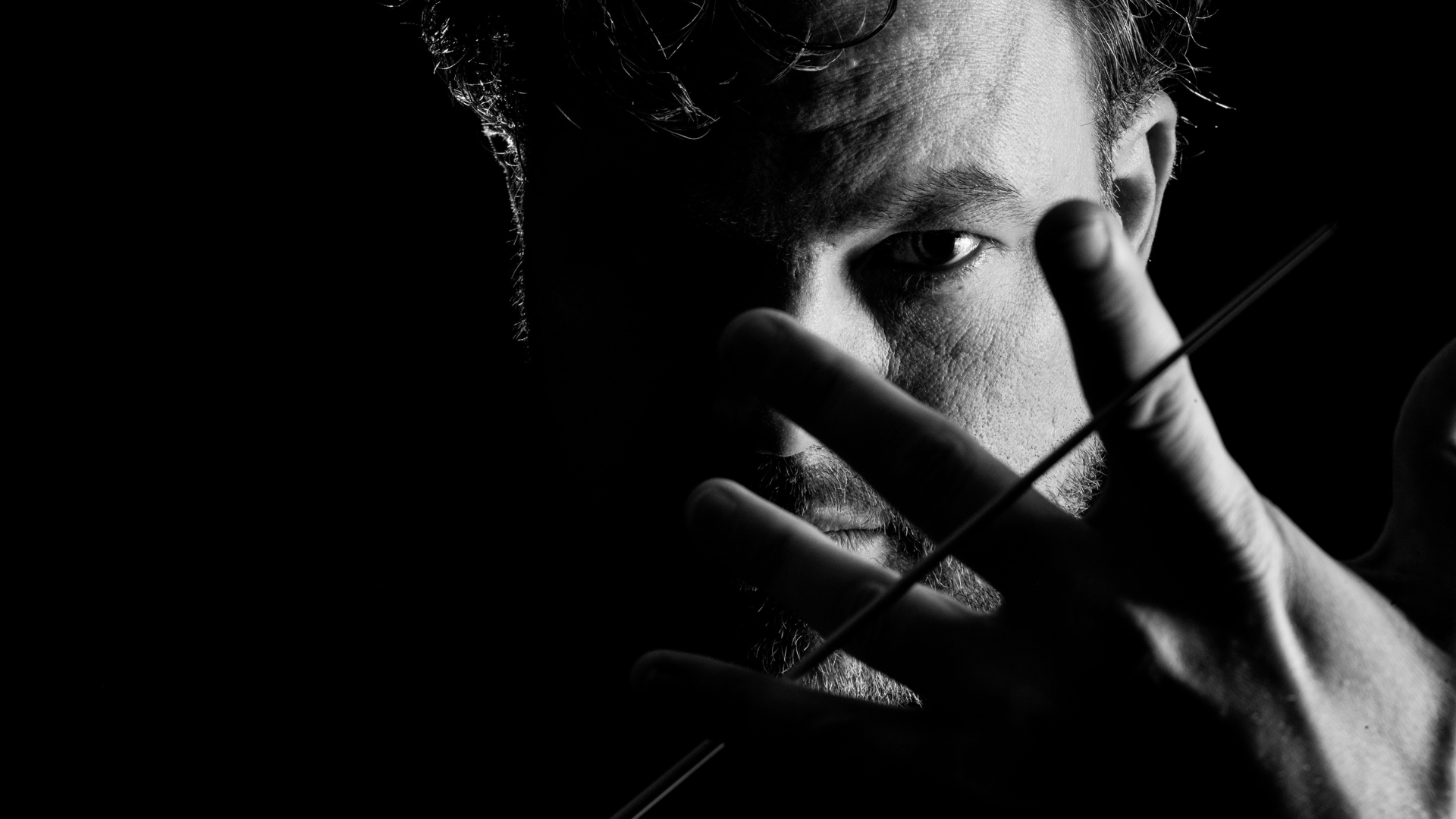



 Christian Kluxen, conductor
Christian Kluxen, conductor Nathalie Paulin, soprano
Nathalie Paulin, soprano
 Vox Humana
Vox Humana